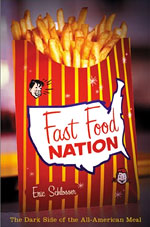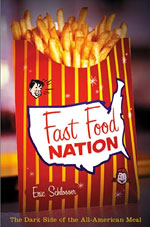Given my distaste for fast food and the general knowledge of its detrimental effect on the American diet, I didn’t expect to find any revelations in Fast Food Nation. But journalist Eric Schlosser’s thoroughly researched and well-written probe into the industry that has transformed American roadsides, eating patterns, and agriculture was actually an eye-opener.

Fast Food Nation
By Eric Schlosser
Houghton Mifflin Co.,
288 pages, 2001
Wanna buy it?
Fast Food Nation traces the history of the fast food industry from modest hotdog stands to the umpteen billion burgers sold as America spread its gospel of quick-and-easy (and greasy) cuisine around the globe. Yet Fast Food Nation is far more than a lament for home cooking and mom-and-pop diners. It is a serious piece of investigative journalism into an industry that has helped concentrate corporate ownership of American agribusiness, while engaging in labor practices that are often shameful.
The McDonald’s, Burger Kings, and Wendy’s of the world have their roots in the car-centric culture of California of the late 1940s and 1950s, a culture that spread as the interstate highway system was laid and suburbs sprawled nationwide. Shrewd entrepreneurs like Carl Karchner and Ray Kroc expanded their drive-in restaurants to accommodate Americans’ increasing mobility and desire for familiarity. By bringing the all-American concept of assembly-line production into the food industry, they started an industry that would be worth billions.
To promote mass production and profits, the industry must keep labor and material costs low. Teenagers and recent immigrants make up much of the fast food workforce, often under intimidating and poor conditions. Turnover is huge, and the companies profit from it: Short-term workers accrue few benefits and are less likely to organize. Schlosser recounts how McDonald’s and its ilk have fought against unions, sometimes closing stores to prevent workers from unionizing.

Want fries with that?
Then there’s the food. Three companies grow and process about 80 percent of all French fries now served by fast food chains. “The multinational food companies,” writes Schlosser, “operate French fry plants in a number of different regions, constantly shifting production to take advantage of the lowest potato prices. The economic fortunes of individual farmers or local communities matter little in the grand scheme.” The same practices are true in the ranching, poultry, and hog industries. And if industrial, chemical-reliant farming isn’t disturbing enough, Schlosser next reveals “why the fries taste good.”
“Flavorists” in laboratories along the New Jersey turnpike concoct the “natural and artificial flavors” found in almost every processed food product. McDonald’s infuses its fries and chicken sandwiches with essences that mimic beef tallow. A milkshake’s strawberry flavor is more likely to come from a test tube than from actual fruit. Yet the list of volatile chemicals in artificial fruit flavors sounds benign after reading the story behind a “quarter-pounder.”
To witness the gruesome business of meat-processing, Schlosser visited slaughterhouses. What he discovered was both repugnant and hazardous. Among the mostly unskilled workforce, severe injuries are common. The meat-processing industry and restaurant chains continually lobby against regulations that would improve worker and food safety. “Anyone who brings raw ground beef into his or her kitchen today must regard it as a potential biohazard,” writes Schlosser. High-volume meat production makes it easy for virulent strains of bacteria to travel far and wide. Schlosser minces no words in explaining a major source of contamination. It’s simple, he says: “There is shit in the meat.”
Fast Food Nation ends with a call for consumers to demand better treatment of workers and more healthful, safer food. “Nobody in the United States is forced to buy fast food,” writes Schlosser. “The first step toward meaningful change is by far the easiest: Stop buying it.” After reading this book, you shouldn’t find that a hard choice to make.



